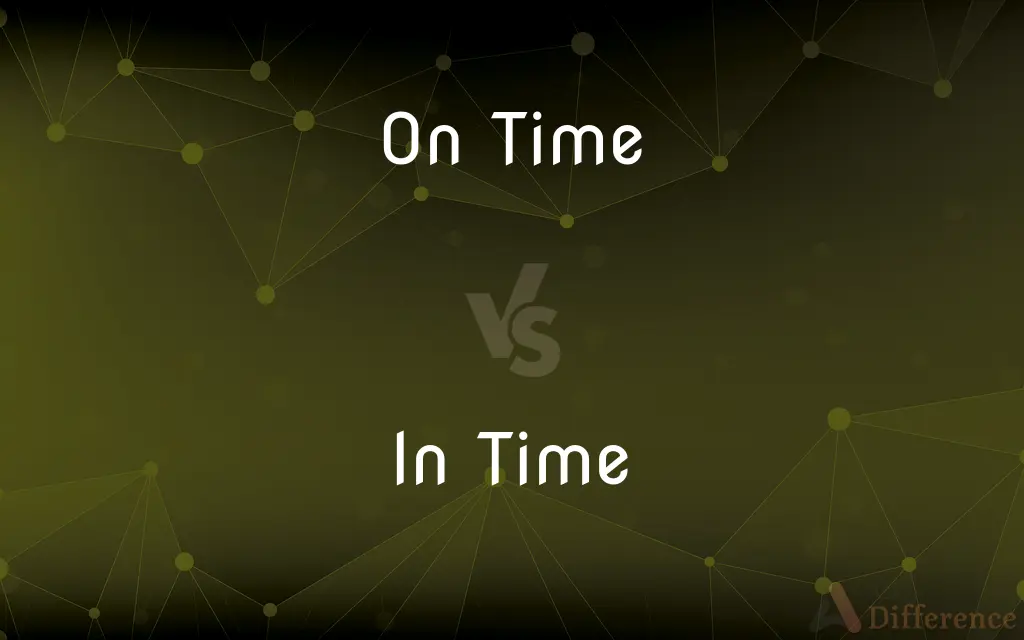On Time vs. In Time — What's the Difference?
By Tayyaba Rehman & Fiza Rafique — Published on October 14, 2023
On Time: Punctual, at the scheduled time. In Time: Before a deadline or event, with some time to spare.

Difference Between On Time and In Time
Table of Contents
ADVERTISEMENT
Key Differences
On Time typically conveys the idea of punctuality. It suggests that something has happened precisely at the expected or scheduled time, neither early nor late. For instance, when a train arrives at the station exactly at 3 PM as per its schedule, we can say it arrived On Time.
In Time, on the other hand, implies that an action or event occurred with some time to spare before a deadline or another event. It often carries a sense of relief or avoidance of potential consequences. For instance, if you submit a project just before the deadline, you made it In Time.
On Time is often about precision and exactness. In contexts like transportation, appointments, or scheduled events, being On Time is crucial. It adheres strictly to the clock and calendar, indicating a strong sense of adherence to schedules.
In contrast, In Time carries more flexibility. It's about being early enough, even if it's just a moment before a deadline. It often signifies prevention from undesirable outcomes, like getting to the hospital In Time to receive necessary medical care or reaching the station In Time to catch the train.
In essence, while On Time emphasizes exact timing, In Time emphasizes sufficiency — ensuring something happens before it's too late.
ADVERTISEMENT
Comparison Chart
Meaning
Punctuality, at the scheduled time.
Before a deadline, with time to spare.
Emphasis
Precision.
Sufficiency, enough time before it's too late.
Usage
Scheduled events, appointments.
Avoiding consequences, early enough.
Time Relation
Exact time.
Before an event or deadline.
Example
Train schedules, meetings.
Saving someone, catching a ride.
Compare with Definitions
On Time
In accordance with a timetable or plan.
The seminar started On Time.
In Time
With some moments to spare.
She finished her task In Time for a break.
On Time
At the scheduled or expected time.
The flight landed On Time despite the weather.
In Time
Before a specific deadline or event.
They arrived In Time for the concert.
On Time
At the precise moment expected.
The sunrise was right On Time.
In Time
Eventually, after a certain period.
In Time, he learned to trust her.
On Time
Marked by punctuality.
She's known to be On Time for every appointment.
In Time
Before the last moment or too late.
We made it to the shelter In Time before the storm.
On Time
Neither early nor late.
He always pays his bills On Time.
In Time
Early enough to prevent something undesirable.
He was saved In Time by the doctors.
Common Curiosities
What does On Time mean?
On Time means being punctual or arriving at the scheduled or expected time.
Which phrase emphasizes precision?
On Time emphasizes precision and punctuality.
Can On Time also mean early?
No, On Time specifically means at the exact scheduled time, neither early nor late.
How is In Time different from On Time?
In Time means arriving before a deadline or event with some time to spare, while On Time means being punctual.
What does it mean if someone reached In Time?
It means they arrived before it was too late or just before a specific event or deadline.
Can I say I completed my project In Time?
Yes, it means you finished it before the deadline.
Does In Time imply a close call?
Often, yes. In Time can imply just making it before it's too late.
Which phrase can suggest relief from potential consequences?
In Time suggests relief, as in reaching somewhere before undesirable consequences occur.
Can I say a train arrived On Time?
Yes, if the train arrived at the scheduled time, it arrived On Time.
Is being On Time a valued trait?
Yes, punctuality or being On Time is often valued in many cultures and professions.
Which term is more about sufficiency in timing?
In Time is more about sufficiency, ensuring something happens before it's too late.
What's the importance of being On Time in business?
Being On Time in business shows professionalism, respect for others' time, and reliability.
When talking about healing, can we use In Time?
Yes, as in "With proper care, the wound will heal In Time."
Can In Time also mean "eventually"?
Yes, in some contexts, "In Time" can mean eventually, as in "you'll understand In Time."
Are On Time and In Time interchangeable?
Not always. While both relate to time, their meanings and usages differ based on context.
Share Your Discovery

Previous Comparison
Flashy vs. Glamorous
Next Comparison
Internal Environment vs. External EnvironmentAuthor Spotlight
Written by
Tayyaba RehmanTayyaba Rehman is a distinguished writer, currently serving as a primary contributor to askdifference.com. As a researcher in semantics and etymology, Tayyaba's passion for the complexity of languages and their distinctions has found a perfect home on the platform. Tayyaba delves into the intricacies of language, distinguishing between commonly confused words and phrases, thereby providing clarity for readers worldwide.
Co-written by
Fiza RafiqueFiza Rafique is a skilled content writer at AskDifference.com, where she meticulously refines and enhances written pieces. Drawing from her vast editorial expertise, Fiza ensures clarity, accuracy, and precision in every article. Passionate about language, she continually seeks to elevate the quality of content for readers worldwide.
















































